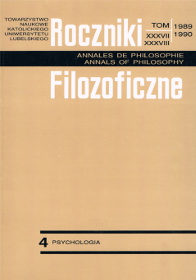Techniki wychowawcze ojców dzieci upośledzonych umysłowo w stopniu lekkim
Abstrakt
The article presents a study of discipline styles preferred by parents of mildly mentally retarded adolescents and the results of the author’s investigations of fathers’ discipline techniques used towards such children.
The author’s own investigations were conducted with the use of A. Gała’s Parents’ Discipline Techniques Inventory on the sample of 160 fathers of mildly mentally retarded adolescents (74 fathers of boys and 86 of girls). The method used in the study allows the children to evaluate how frequently the three types of discipline techniques are used: i n d u c t i o n (reasoning and explanation of the consequences of the child’s actions for others), l o v e w i t h d r a w a l, and p o w e r a s s e r t i o n. The results of the study show that:
1. The discipline technique that is least frequently used in the child-rearing process by the fathers of mildly mentally retarded adolescents is l o v e w i t h d r a w a l. This technique is rejected by 26.9% fathers (29.7% fathers of boys and 24.4% fathers of girls), 56.9% fathers use it rarely (55.4% fathers of boys and 58.1% fathers of girls), and only 1.3% (1.4% fathers of boys and 1.2% fathers of girls) apply it often.
2. P o w e r a s s e r t i o n as often used towards mildly mentally retarded children appears in 8.8% fathers; more frequently towards sons (9.0%) than girls (5.8%). The remaining over 60% fathers use this technique rarely (44.4%) or reject it completely (16.3%). 3. Slightly more than 20% fathers of mildly mentally retarded adolescents often use i n d u c - t i o n as the model for rearing their children. More than 30% use it rarely (less frequently towards boys − 29.7%, than girls − 17.4%, or even reject it (6.9%). This technique is more often rejected by fathers of boys (8.1%) than of girls (5.8%).
From the study it follows that only about 20% fathers of mildly mentally retarded adolescents use the proper discipline technique, i.e. induction.
Copyright (c) 1990 Roczniki Filozoficzne

Utwór dostępny jest na licencji Creative Commons Uznanie autorstwa – Użycie niekomercyjne – Bez utworów zależnych 4.0 Międzynarodowe.





